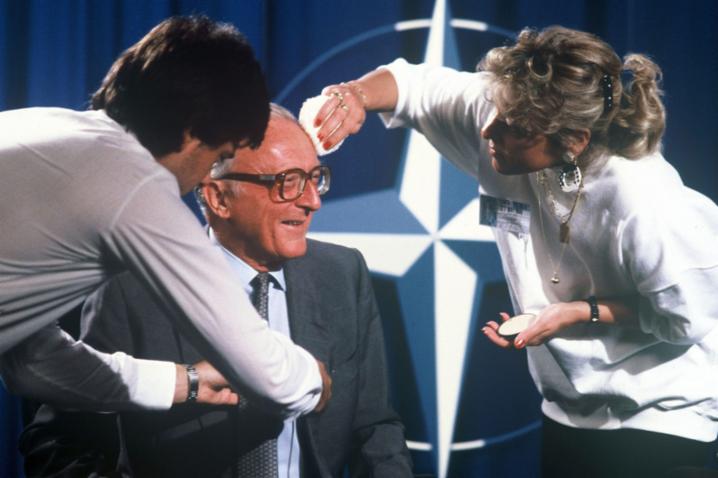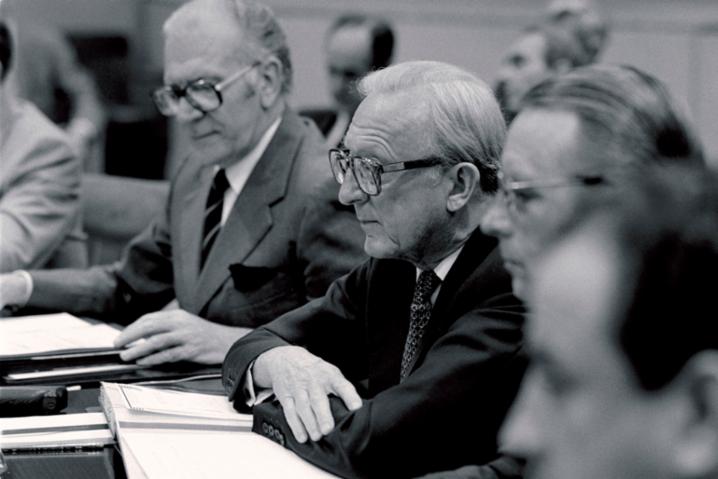We look back at the record of Lord Peter Carrington, NATO's sixth Secretary General, who helped steer the Alliance through a time of transatlantic tensions. He died two years ago, on 9 July 2018.
The office of NATO’s Secretary General has been filled with talented and instrumental leaders, who worked to advance consensus and cooperation among the Allies. Among them is Lord Peter Carrington, who oversaw the Alliance from 1984 to 1988 in the final years of the Cold War. Though leading the Alliance in a different era with a range of systemic and institutional constraints, Carrington’s unique skills and leadership style helped advance NATO and transatlantic unity during these tumultuous times.

Lord Peter Carrington prepares to meet the press on his first day in office as NATO Secretary General – 25 June 1984. © NATO
Carrington came into office in 1984 with a desire to reignite and re-energise NATO upon his predecessor's departure. Secretary General Joseph Luns, who had occupied the office for the previous 13 years, brought his own skills to the office, with a sense of flair and panache for leading the Alliance. Nonetheless, by nearly universal account, Luns remained in office well past his prime, resulting in an Alliance that "was asleep” – both in terms of policy and institutional ambition. NATO's mission was still almost exclusively focused around its relationship with the Soviet Union, which limited its political scope and ambitions. But, even in this context, it was understood that the Alliance needed new gravitas and initiative.
Though NATO's historical record under Luns and his predecessors had been viewed as a success by many, Carrington sought to bring new vigour and respect to the office. He was fond of saying “You don’t stop paying your fire insurance just because you never had a fire.” Thus, Carrington strongly believed that NATO needed new relevance and that its current purpose and the need-to-prepare NATO for the next generation remained as important as ever.
Carrington was not considered as a conceptualist but rather a pragmatic policy leader. In this capacity, he helped advance a number of strategic priorities. Among his first steps in office, and breaking with past tradition, Carrington approached Europe's liberal democracies, reaching out to Austria, Sweden and Switzerland, signalling the Alliance's interest in engaging with countries that were not members of NATO. Though this was only a small and symbolic step, Carrington helped plant the seed for developing dialogue and cooperation with non-members. This soon came to fruition as NATO's mission expanded considerably with the launch of crisis-management operations in the Western Balkans and the Allies developed frameworks for cooperation with partner countries in the 1990s.
Another strategic priority for Carrington was to make the case for the deployment of the United States’ Pershing II missiles in Europe. He firmly believed that these deployments would provide the necessary demonstration of Alliance capabilities to advance NATO’s diplomacy. Carrington faced skeptical European publics in promoting the cause, though he never retreated in his public diplomacy.
In the face of tremendous pressure from the United States, led principally by United States Senator Sam Nunn, Carrington also worked diligently to help increase European defence spending. Burden-sharing has long been a bone of contention between the United States and its Allies. But, at the time, Carrington and Europe faced a direct challenge and open threat from Senator Nunn, who advanced proposals gradually to reduce American troop presence in Europe if the Allies did not devote more to defence. Nunn had bipartisan support, so his actions represented a real and significant challenge to European defence spending practices.
Former US Ambassador David Abshire notes that Carrington was instrumental in addressing the rather intense concerns raised by Senator Nunn and others. He could bring a "light touch" that was effective in managing these difficult transatlantic issues. In this context, he helped advance the cause, resulting in improved conventional defences for Europe and tamping down American diplomatic challenges to Europe.
Carrington also helped sustain Spain's new membership in NATO (the country had joined on 30 May 1982 despite considerable public opposition), as the new government led by Felipe Gonzalez – which included Javier Solana who later became Secretary General of NATO – were at the time uncertain partners. Like the pragmatist he was, Carrington travelled to Spain in 1984, prepared to bargain for whatever kind of partnership, military or political, the government felt would best suit the country’s interest. He worked closely with then Supreme Allied Commander Europe Bernard Rogers to craft a diplomatic and military dialogue that was well received by Spain, although it did not join NATO’s integrated military structure until 1996.
Carrington faced other transatlantic tensions during his tenure, such as the bombing of Libya in 1986 and major arms control proposals that occurred without any NATO consultation. He successfully navigated these "crises" and helped maintain and manage Alliance cohesion.
Reforming NATO
Along with his diplomatic successes, Carrington introduced a host of reforms within NATO's corridors to help re-energise the organisation. One of his first steps was to modernise the operation of the Private Office of the Secretary General and to put in place procedures to help improve efficiency. Those who worked with him remarked on his highly competent and professional staff. He also expected the Assistant Secretaries General to bring policy expertise and substantive proposals to his office.

NATO Secretary General Lord Carrington made a point of ensuring that all North Atlantic Council meetings began on time. © NATO
With regard to efficiency, one of Carrington’s first organisational actions was to ensure that all meetings of the North Atlantic Council (NAC) – the principal political decision-making body within NATO – began on time, precisely at 10 am. If ambassadors were not present, he still charged forward, banging his gavel, requesting that second- or third-ranking officials from the national representation be present to take the ambassador’s chair at the table. Carrington viewed his actions as a display of respect to those present to begin on time but also underlined that NATO had business to do. To ensure that NAC sessions advanced successfully, like his predecessors, he skillfully used the private informal Tuesday luncheons with ambassadors to determine what issues could and could not be advanced in open sessions the following day.
Carrington also went to great lengths to represent the Alliance in the best way possible, such that the Allies as well as their domestic political audiences would respond favourably to NATO’s purpose and mission. In his memoir, he recalls that he felt a duty to excel in “the field of communicating.” In doing so, he sought many and varied venues to speak about NATO’s mission and purpose. His polished and poised performances in public were the result of considerable effort and prior preparation. With assistance from his Private Office staff, including his Deputy Director Marc Grossman, Carrington would prepare exhaustively for interactions with the press, practicing for the likely questions and public challenges to come.
Along with his wife, he also made extensive efforts to socialise and be present during the evenings, which for them was nearly every evening – all with the purpose of both gaining additional information and better informing others about NATO’s purpose.
Relatedly, Carrington placed great emphasis on NATO’s two official languages, English and French, noting the challenges this may cause to different Allies and ensuring that communication remained transparent and open to all members.
Carrington himself wrote that as Secretary General he felt “undeniable frustration” given that NATO’s principal political leader has few formal tools to exercise political power. Nonetheless, he welcomed and arguably cherished his role. His colleagues vividly recall his professionalism, charm and kindness. It is clear that his closest associates and colleagues viewed him as a relevant player in shaping NATO's direction at the time. His views were sought to help resolve difficult and contentious issues in times of transatlantic crisis, and his efforts were valued and impactful. In his own words, Carrington led as “the servant of an institution”, which squares closely with his leadership legacy.
